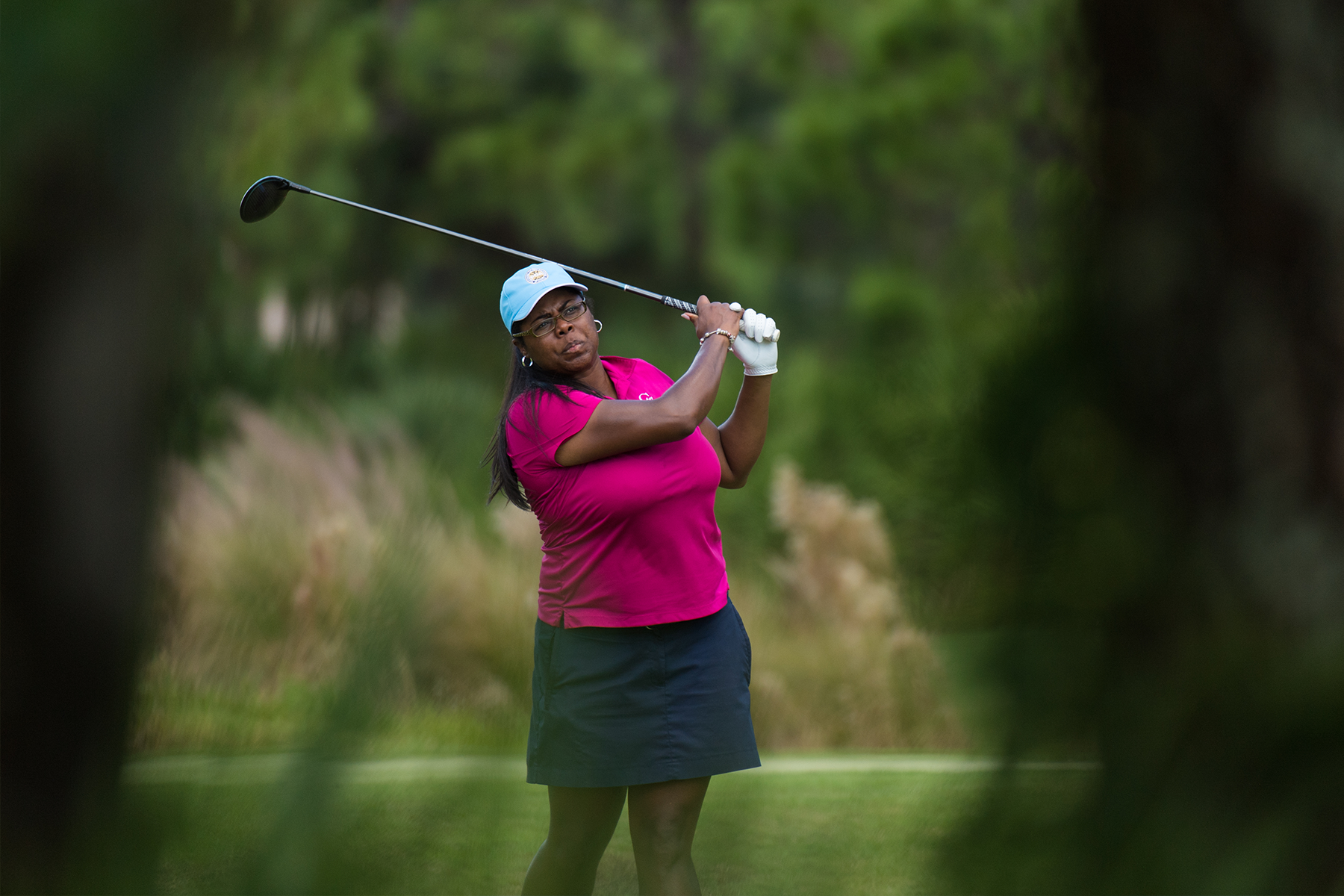Game Changers
Celebrating Black History Month: The Pioneers - Maulana Dotch, PGA
Published on

Maulana Dotch hits her shot during the Delegate Golf Outing for the 103rd PGA Annual Meeting at the PGA Golf Club on November 7, 2019 in Port St. Lucie, Florida.Photo by Montana Pritchard/The PGA of America
Editor's Note: The story below originally ran in the February 2021 issue of PGA Magazine in celebration of Black History Month.
Imagine blazing a new trail, yet not truly realizing the impact and significance of the path you paved. Imagine pursuing your passion for the pure love of the game, while charting the course of history.
For Maulana Dotch, exactly that is happening in real-time. In January, she was named General Manager of Hermann Park Golf Club in Houston, after spending 10 years at Cedar Crest Golf Course in Dallas. She is the first African-American woman PGA Member to become a GM.
Dotch is used to setting a standard of excellence. In 2010, she became just the second Black woman to become a PGA Member, following in the footsteps of her mentor, PGA Hall of Fame Member Renee Powell, who earned her card in 1996.
“Renee always asks me, ‘What are you doing next?’” explains Dotch. “She’s constantly questioning--reminding me to not be stuck thinking things through. She always tells me, ‘Stay active. Stay involved. Don’t become complacent. Enjoy what you do.’”
“I love Maulana because she is always not afraid to take the next step,” said Powell, PGA/LPGA Head Golf Professional of Clearview Golf Club in Canton, Ohio. “Now, she is spreading her wings going down to Houston, and I think it’s terrific. She is a person others will also follow. She will continue to set an example for other females that they can do it, too.”
Currently, there are 173 African-American PGA Professionals, including eight women PGA Members: Powell, Dotch, Sherri Pla, Ashley Nicks, Mackenzie Mack, Jasmin Cunningham, Tiana Jones and Reina Kearns.
The Path to PGA Membership
Alongside her brothers, Dotch learned the game from her father, Emanuel Dotch, on a high school field in Irving, Texas. Maulana was left-handed. Yet, there were no clubs for southpaws to be found. So, her dad cut down his right-handed clubs, and she learned to play from her unnatural side. Emanuel was amazed by her progress. If he shaped a 3-wood, she would hit a matching shot. If he hit a 7-iron, she would curve the ball the same way.
She competed on the boy's golf team in high school. In college, Maulana played on four victorious PGA Collegiate Championship teams at Bethune-Cookman University. Her senior year, she won the Individual title.
Despite playing at a Historically Black College and University (HBCU), she was the only Black woman on the team. Two others lost their scholarships her freshman year.
Still, Dotch’s teammates represented global diversity, hailing from South Africa, Scotland, Australia and the United States.
“We had a good time, and we were really good,” said Dotch, 40, a member of the Bethune-Cookman Athletics Hall of Fame and the Texas Black Sports Hall of Fame. “While I felt like I was doing something I wanted to do, I was always the loner. In high school, there were no other Black girls. In college, it was just me. When I got older, I realized what I did. I realize now that I have a platform of power.”
Dotch parlayed her stellar college career into a stint on the Symetra Tour. Afterward she was inspired by PGA Members Ira Molayo and Leonard Jones to become a PGA Professional.
“I knew there weren’t many Black PGA Members,” said Dotch. “People started telling me this was a big deal that there were only two of you.”
While at Cedar Crest under the tutelage of Molayo, Dotch built a thriving junior program of 70 kids during a pandemic, the most the facility has ever had.
“It’s about being intentional,” Dotch explained. “Our main thing was being an access point for kids in the neighborhood.”
Now 78-years old, Emmanuel Dotch grew up in Mobile, Alabama, in the 1950s and 1960s at the epicenter of the Civil Rights movement. Due to Jim Crow laws and blatant racism, he wasn’t allowed to play on a golf course. Denied full access to the game he loved, Dotch opted to become a caddy.
A half-century later, Emmanuel watched his daughter receive her PGA Membership card.
“In the 1960s, I would have never thought it would happen,” explained Dotch. “I never thought it would be a reality, but when I started teaching her, I knew it was in her midst.”
“I have access he didn’t have,” said Maulana. “We’ve come full circle.”